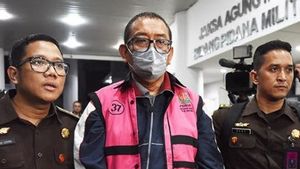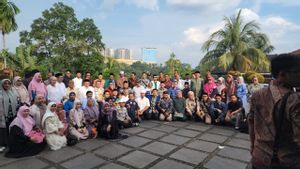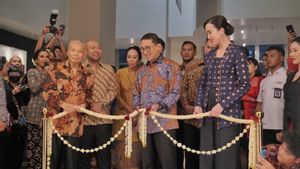JAKARTA - Since the corona virus or COVID-19 broke out from late 2019 to early 2020, one of the business sectors that has also felt the impact is the hotel business. How could it not be, COVID-19 makes tourists have to refrain from traveling.
Not only foreign tourists (tourists), domestic tourists (wisnus) must also refrain from traveling. As a result, the occupancy rate or occupancy of hotels in the country immediately dropped, and of course it will affect the income from these hotels.
The Indonesian Hotel and Restaurant Association (PHRI) also said that the impact of COVID-19 on the hotel business occurred in two phases. First, when the virus had not yet entered Indonesia. Second, after Indonesia tested positive for COVID-19.
PHRI Deputy Chairman Maulana Yusran said that in the first phase, it began to have an impact on destinations targeting the foreign tourist market, such as Batam, Bintan, Bali and Manado. "In that phase, it will directly impact the foreign tourist destinations," said Maulana to VOI, Monday, March 9.
During the second phase where COVID-19 had entered the country, according to Maulana, almost all areas were affected. In fact, hotels that are outside tourist destinations even though they are not in high season conditions, will usually still be visited by business people or domestic tourists.
However, after Indonesia tested positive for COVID-19, wisnus began to panic and canceled his travel plans. "So that there was a very drastic decrease in occupancy. It varies in various regions, the occupancy rate since COVID-19 was only around 20 to 40 percent," he explained.
PHRI is currently still recording which areas have experienced the most drastic decline in occupancy. However, Maulana confirmed, the decline in occupancy occurred in almost all regions in Indonesia.
"Which one has the biggest impact? Everyone is affected. Wisnus also becomes restrained in his movements. Even though this wisnus usually fills up when foreign tourists cannot enter," he said.
Most Affected Areas
If you look at the market characteristics of tourist areas, said Maulana, the one most affected is Manado. Because, he said, Manado is indeed targeting foreign tourists, especially from China.
"Actually, Manado's market is too dependent on China. Furthermore, those who depend on tourists from China are Batam and Bintan. The two regions also depend on tourists from South Korea," he explained.
For Bali, which according to data from the Bali Central Bureau of Statistics (BPS) experienced a decline in occupancy in January 2020, said Maulana, the island's characteristics do not depend on one type of market. Because, he said, the target tourists for all tourist destinations in Bali came from various countries, including domestic tourists.
Regarding the total amount of losses due to COVID-19, Maulana admitted that he could not mention the amount. This is because data collection is still being carried out in all regions in Indonesia. However, there are some areas that do not have an impact on phase one where COVID-19 has not been positive in Indonesia.
"Some areas where the big market was domestic tourists, during the first phase there was no problem. Because it turned out that their foreign tourists only had an impact of 0.1 percent of the total. But after this (COVID-19) was announced, their occupancy immediately dropped to 20 to 20. 30 percent. This means the fact that the problem of domestic tourists' movement is also hampered after the announcement of the corona is in Indonesia, "he said.
Keep on Effort
Although the government is trying to help the hotel business by providing tax exemption incentives for hotels and restaurants for the next six months, in fact this has not been realized and is still in the discussion stage between the central and regional governments.
Finally, PHRI still has to rack its brains how to make this hotel business continue to exist amidst the uncertainty caused by COVID-19. Maulana explained that his party was preparing a special strategy to encourage the movement of domestic tourists.
PHRI now only hopes for domestic tourists by holding the Visit Wonderful Indonesia (Viwi) Nusantara Shocking Deal 2020 program. The program, he said, will also put hopes on the 2020 Lebaran holiday.
The outbreak of the corona virus has made many domestic tourists discourage traveling abroad. That way, changes in market patterns that occur can be taken advantage of by offering the lowest tour package prices through the 2020 Viwi Nusantara Shocking Deals.
The attractive offers range from airline tickets, hotel rooms, tours, park tickets, land and sea transportation as well as attractive discounts from shopping centers and retail shops. The program is also expected to be able to encourage an increase in domestic tourist travel.
"We make (the offer) can be combined between airlines and hotels, or later also make the hotel itself, the airline itself. Because this is how, at the time of Eid, the average person has a homecoming holiday. Hotel packages and plane tickets are one of the ways. which will be done to revive the hotel business in the midst of the COVID-19 outbreak, "he explained.
Greater Jakarta Not Yet Affected
Meanwhile, hotels in the Greater Jakarta area have not been too affected by COVID-19. At least this is what one hotel entrepreneur said, namely PT Esta Multi Usaha Tbk, which has a hotel in the Bekasi area.
President Director of PT Esta Multi Usaha Tbk, Lukman Nelam, admitted that so far the impact of the COVID-19 outbreak has not had an impact on his business in the hotel sector.
"If I take an example, in Bekasi, our Hotel 88 has no influence. There is not yet, and hopefully not," said Lukman.
Lukman revealed that the strategy his party had taken to exist in the midst of the COVID-19 outbreak was to maintain the existing work patterns. He said, such as cooperation with GWStore.
"So they can always supply us guests. There (Bekasi) have offices, for example government offices. Then there are also factories that hold activities and use our premises. Because our target is mostly business people," he explained.
The English, Chinese, Japanese, Arabic, and French versions are automatically generated by the AI. So there may still be inaccuracies in translating, please always see Indonesian as our main language. (system supported by DigitalSiber.id)







